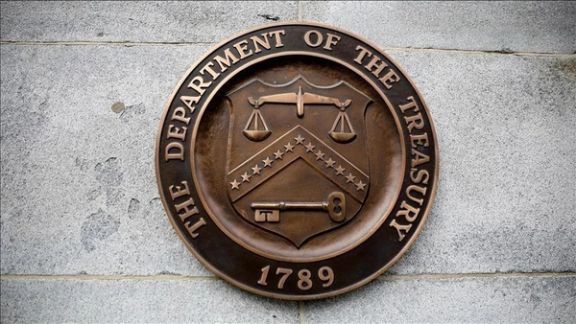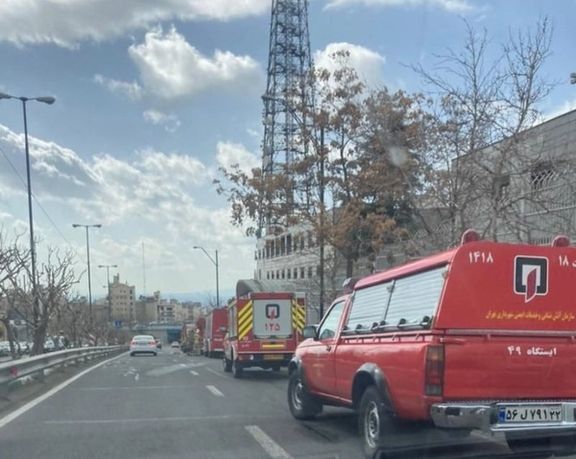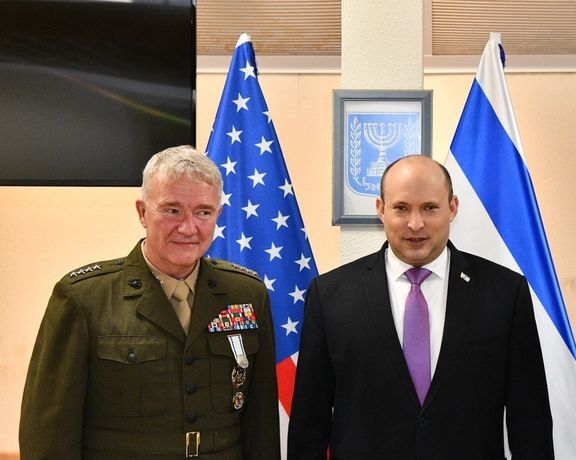US Sanctions Two Iran-Backed Hezbollah Financiers In West Africa

The United States Department of the Treasury has sanctioned two key financiers of Iran-backed Hezbollah group operating in Guinea.

The United States Department of the Treasury has sanctioned two key financiers of Iran-backed Hezbollah group operating in Guinea.
On Friday, the Treasury’s Office of Foreign Assets Control (OFAC) designated prominent Lebanese businessmen Ali Saade and Ibrahim Taher under Executive Order 13224 -- declared by former President George W Bush in 2001 – that targets terrorists, leaders, and official of terrorist groups, and those providing support to terrorists or acts of terrorism.
Saade – with links to designated Hezbollah supporter Kassim Tajideen -- initiated money transfers from Guinea to the Iran-backed group in Lebanon. Taher has been identified as one of the most prominent financial supporters of the group in Guinea, who is believed to employ several individuals affiliated with Hezbollah within the country.
Tajideen was freed from jail in the United States in June 2020 as a result of indirect contacts between Tehran and Washington.
According to a statement by the Treasury, the new sanctions are aimed at “disrupting Hezbollah’s business network in West Africa” and exposing “businessmen who support Hezbollah’s destabilizing activities through bribes and other corrupt activity”.
The United States designated Hezbollah as a Foreign Terrorist Organization on October 8, 1997, and as a Specially Designated Global Terrorist (SDGT) on October 31, 2001.
In January, US sanctioned three other individuals and their company with links to Hezbollah for exploiting Lebanon's economic resources for the benefit of the militant group.

Victims of the 9/11 terror attacks seek the seizure of Iranian crude oil from a tanker to help satisfy a $3.61 billion judgment against Iran over the attacks.
The request came in filings on Thursday with the US District Court in Manhattan.
The filings come as US investigators continue to probe the alleged involvement of the Suez Rajan, owned by Los Angeles-based private equity firm Oaktree Capital Management, in the sanctioned trade of Iranian oil as negotiations continue over Tehran’s nuclear deal with world powers.
Dozens of attack victims and their families said the Suez Rajan, idling in Southeast Asia, appeared to be carrying up to 1 million barrels of Iranian oil, violating US sanctions.
They said the oil should be seized and sold by the United States to help cover their February 2018 judgment against Iran over that country's providing material support to al-Qaeda related to the attacks. Iran has long denied such claims.
Oaktree has about $166 billion of assets under management. Neither the firm nor its London-based Fleetscape unit, which finances the Suez Rajan, immediately responded on Friday to requests for comment by Reuters.
The request came after the nonprofit United Against Nuclear Iran, which uses satellite images to track tanker movement, wrote Oaktree on February 15 that the Suez Rajan appeared to have taken on the oil from another tanker two days earlier.
Satellite photos from Planet Labs PBC of that area obtained by The Associated Press appeared to show the ships alongside each other. At sea, oil tankers can funnel crude between each other in a ship-to-ship transfer that typically sees boats in a similar position.
In separate Planet Labs satellite images from January 16, the Virgo appears to be loading crude oil from Iran’s Khargh Island, its main oil distribution terminal in the Persian Gulf. Tracking data separately shows the vessel near Khargh around that time before heading to Singapore.
Iran has increased its illicit oil exports since late 2020 with shipments estimated to top one million barrels a day, mostly going to China. The favorite method to hide the source of the shipment is ship-to-ship oil transfers and fake documents shwoing countries other than Iran as the origin of the cargo.
The Biden Administration has reportedly relaxed its sanctions enforcement to encourage Iran to come to an agreement in the nuclear talks in Vienna.
Even if the oil were seized, sales proceeds at current prices LCOc1 would cover only about 3% of the $3.61 billion judgment.
Victims said about $3.44 billion is outstanding, with the National Iranian Oil Co and National Iranian Tanker Corp, both under US sanctions, among the entities responsible to pay it.
Judgments against accused state sponsors of terrorism are often impossible to enforce.
The US government’s 9/11 Commission found Iranian officials met with al-Qaida leaders in Sudan in either 1991 or early 1992. The commission said al-Qaida militants later received training in Lebanon from the Shiite militant group Hezbollah, which Iran backs to this day.
Nearly 3,000 people died on September 11, 2001, when terrorist flew hijacked passenger planes into New York's World Trade Center, the Pentagon in northern Virginia, and a Pennsylvania field.
With reporting by Reuters and AP

A teenage girl who was a victim of child marriage set herself on fire in southeastern Iran due to "domestic violence" and “lack of support by her own family”.
The 17-year-old girl, who was identified as F. Marandegani, killed herself on Wednesday in the Bampur County in the Sistan and Baluchistan province, a website for local Baluch activists reported.
The report said she was physically and mentally abused and her husband frequently beat her.
This is the second case of self-immolation of a Baluch child bride in the past few months.
The campaign of Baluch activists reported a similar case in December. The self-immolation victim was 16 years old and was also harassed by her spouse.
In February, a 17-year-old wife and mother of a three-year-old, Mona Heydari, was beheaded by her husband in a case of 'honor killing'.
According to figures published by Iran Statistical Center (ISC), child marriage is rising in Iran, with 9,750 girls aged 10-14 officially wed in a three-month period.
Another report said that the numbers published by ISC reflected only registered marriages and not unregistered ones, which are common in rural areas.
In the Islamic law (or Sharia), the minimum age of marriage for girls is 13 and for boys 15.

United States President Joe Biden Friday extended for a year a 1995 executive order declaring a “national emergency” with regard to “the government of Iran.”
The ‘emergency’ gives the president powers to circumvent usual judicial and administrative procedures, including imposing sanctions and seizing assets. A similar order was used in February to impound Afghanistan’s $7 billion foreign reserves.
Biden specifically extended Executive Order 12957, declared by President Bill Clinton March 15, 1995, which was aimed originally at stopping a deal between Iran and Conoco. On May 6, 1995, Clinton issued another executive order, imposing wider sanctions on Iran, and the ‘emergency’ has been maintained ever since.
The White House statement Friday referred to the “actions and policies of the Government of Iran — including its proliferation and development of missiles and other asymmetric and conventional weapons capabilities, its network and campaign of regional aggression, its support for terrorist groups, and the malign activities of the Islamic Revolutionary Guard Corps and its surrogates.”
The statement, signed by Biden, claimed Iran continued “to pose an unusual and extraordinary threat to the national security, foreign policy, and economy of the United States.”
The renewal of the ‘national emergency’ might sour but will not stop efforts in Vienna to renew the 2015 Iran nuclear deal, the Joint Comprehensive Plan of Action (JCPOA). The US ‘emergency’ was in place throughout previous negotiations leading to the deal in 2015.

Internet services on mobile phones and landlines were disrupted Friday morning in the Iranian capital Tehran and the nearby city of Karaj.
According to reports on social meida, many websites are not available via all internet service providers (ISPs) of the country. Most news websites are not even available from abroad.
Unconfirmed reports in social media say the reason is a fire at the Telecommunication Infrastructure Company.
Some social media users who are not living in Tehran or Karaj also say their internet is down.
The public relations manager of the Ministry of Communications and Information Technology, Mehdi Salem, told IRNA that the disruption was caused by a problem in one of the data centers (LCT) in Tehran. He did not say what the nature of the problem was.
He added the problem was resolved after about an hour, but despite this statement service remained largely unavailable.
On Thursday, a report by the Iran’s state-run news agency IRNA said the internet penetration rate has surpassed 122 percent in the country.
The government blocks thousands of websites and top social media apps in abid to control the flow of information.
Iranians were outraged last week when a group of 18 hardliners in a parliament committee claimed that they had ratified a bill to further restrict internet and social media access.
Some people reacted to the disruption by blaming the authorities, saying the outage was a trial run for the plan to restrict internet and social media, which hardliners are pushing for.

The outgoing chief of the United States Central Command (CENTCOM) visited Israel to discuss maintaining regional stability and threats posed by Iranian threat.
General Kenneth F. McKenzie Jr, who arrived on Wednesday for the last time in his official position, was the guest of IDF Chief of Staff Lieutenant-General Aviv Kohavi, and met with President Isaac Herzog, Prime Minister Naftali Bennett and Defense Minister Benny Gantz on Thursday.
A statement by the Israeli prime minister said that they discussed the common security challenges facing Israel and the US, “especially Iran's aggression in the region” as well as in Syria and Lebanon.
“The Prime Minister also stressed the real danger of the [world] powers signing the nuclear agreement [with Iran], if and when it occurs,” the statement said.
Referring to Israel’s move from the US military’s European Command (EUCOM) to CENTCOM, Gantz stressed the importance of Israel’s integration into CENTCOM, saying it “enables us to increase cooperation to maintain a more secure and stable Middle East.”
“We also discussed challenges both near and far, including Iranian regional aggression, and the developing conflict in Ukraine”, he twitted.
Asharq al-Awsat cited sources in Tel Aviv that this visit was scheduled for the end of the month, but McKenzie arrived ahead of time to witness joint drills by US and Israeli air forces over the Red Sea aimed at improving capabilities in shooting down drones by Iran-backed groups.
McKenzie will be succeeded by Lt. Gen. Michael Kurilla who currently serves as commander of the US Army 18th Airborne Corps.